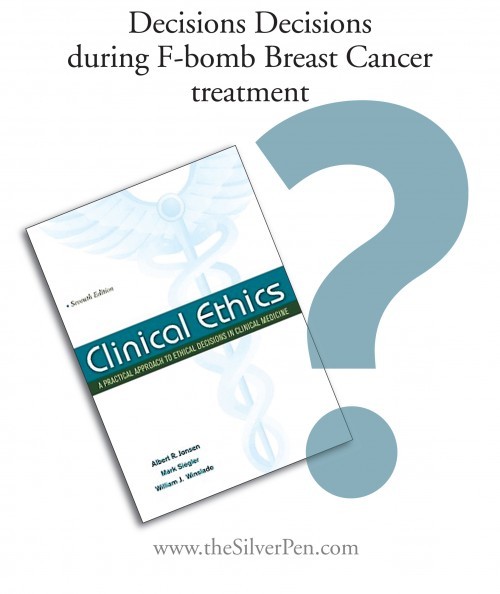I find myself at a real crossroads right now with big decisions to make about chemo and radiation, e.g., To do. Not to do. If doing, how much?
Rather than make my FBC sitation subjective (as Chemo Sobby is want to do), I need to be fully objective as I take the next steps in creating my plan of care.
One big misnomer, by the way, is that doctors (soley) develop a patient’s plan of care. No. No. No. Patients have a real responsibility to be fully engaged in the development (and revision) of a plan of care.
So, in thinking about it “from the other side of the bed,” I put my professional hat on and thought: How would I handle this situation if I were counseling a patient?
The first thing that popped into my head was to utilize a fabulous clinical decision-making tool that I used at the bedside (on a daily basis in my clinical practice).
In 2002, I had the great opportunity to be a MacLean Center Bioethics Fellow at the University of Chicago. It was an incredible educational experience from which I learned how to demystify clinical decision making by asking objective questions, the answers to which would guide the way through the complexity of real cases. We used the following textbook:

During my Fellowship, every clinical case was analyzed by means of following the following four topics:
- Medical Indications. Refers to the diagnostic and therapeutic interventions that are appropriate to evaluate and treat a problem.
- Patient Preferences. The choices that a patient makes when faced with decisions about health and medical treatment determined by an assessment of a patient’s own values and personal assessment of benefits and burdens of treatment.
- Quality of Life. Patients and their physicians must determine what quality of life is desirable, how it is to be attained, and what risks and disadvantages are associated with the desired quality. Preferences and quality of life bring out the most common features of the medical encounter and subsequent decision making.
- Contextual Features. Every clinical case is embedded in a larger context of persons, institutions, and financial and social arrangements. The possibilities and the constraints of the context can influence patient care, positively or negatively. Clinical decisions, therefore, may have psychological, emotional, financial, legal, scientific, educational, or religious impact on others.
How, then, to translate this knowledge into action?
By asking the following questions during initial and ongoing discussions with your healthcare provider about your treatment (insert “me, my or I” when it says “the patient”):
- Medical Indications:
- What is the patient’s (my) medical problem? DCIS (Ductal Carcinoma In Situ) & IDC (Invasive Ductal Carcinoma). Multifocal T1C (i.e., each of my tumors was less than 2 cm). Grade 2. Negative Margins. Lymphatic/vascular invasion. ER-Positive. HER-2 Negative.
- What is the prognosis?
- Is the problem acute? chronic? critical? emergent? reversible?
- What are the goals of treatment?
- What are the probabilities of success?
- What are the plans in case of therapeutic failure?
- How can the patient be benefited by medical care, and how can harm be avoided?
- Patient Preferences:
- Based on a patient’s experience, beliefs and values, what does the patient state about preferences for treatment?
- Quality of Life:
- What sort of life will the patient have during and long after the treatment?
- What are the risks and benefits associated with quality of life based on the long-term consequences of accepting or refusing a recommendation for medical intervention?
- What are the prospects, with or without treatment, for a return to normal life?
- What physical, mental, and social deficits is the patient likely to experience if treatment succeeds?
- Are there biases that might prejudice the provider’s evaluation of the patients’s quality of life?
- Is there any plan and rationale to forgo treatment?
- Contextual Features:
- Are there family issues that might influence treatment decisions?
- Are there provider issues that might influence treatment decisions?
- Are there financial and economic factors?
- Are there religious or cultural factors?
- Are there problems of allocation of resources?
- Is clinical research or teaching involved?
- Is there any conflict of interest on the part of the providers or institution?
Anytime you or a family member has difficult decisions to make and a plan of care to develop, I highly recommend using this tool as a starting point and frame of reference for dialogue about the development and revision of a plan of care.
It was quite a Silver Lining that my brain worked well enough to be able to apply some of my professional experiences to my own clinical situation (never in a million years would I have thought that I would be doing this!). I’m just grateful that the next steps in my FBC planning process will be thoughtful, analytical and objective.
Life is the sum of all your choices.
~Albert Camus



This is so full of rich and applicable information Hol, thank you! You are a SL to me!
Wow, what a great posting. VERY helpful to anyone going through FBC or any other medical crisis. Have you come to a decision about radiation?